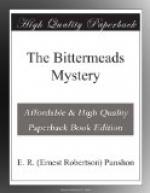The thought occurred to Dunn that this was just such a pretty and secluded spot as two lovers might choose to exchange their vows in, and the thought stung him intolerably as he wondered whether it was for such a reason that Ella had come here.
But if so, why had she fled away again in such strange haste?
He walked on slowly for a yard or two, not now attempting to follow Ella’s trail, for he had the impression that this was her destination, and that she had gone no further than here.
All at once he caught sight of the form of a man lying hidden in the long grass that nearly covered him from view just where the far-spreading branches of the great oak ceased to give their shade.
At first Dunn thought he was sleeping, and he was just about to call out to him when something in the rigidity of the man’s position and his utter stillness struck him unpleasantly.
He went quickly to the man’s side, and the face of dead John Clive, supine and still, stared up at him from unseeing eyes.
He had been killed by a charge of small shot fired at such close quarters that his breast was shot nearly in two and his clothing and flesh charred by the burning powder.
But Dunn, standing staring down at the dead man, saw not him, but Ella. Ella fleeing away silently and furtively through the trees as from some sight or scene of guilt and terror.
He stooped closer over the dead man. Death had been instantaneous. Of course there could be no doubt. From one hand a piece of folded paper had fallen.
Dunn picked it up, and saw that there was writing on it, and he read it over slowly.
“Dear Mr. Clive,—Can
you meet me as before by the oak
tomorrow at eleven? There is something
I very much want to
say to you.—Yours sincerely,
“Ella
Cayley.”
Was that, then, the lure which had brought John Clive to meet his death? Was this the bait that had made him disregard the warnings he had received, and come alone to so quiet and solitary a spot?
Dunn had a moment of quick envy of him; he lay so quiet and still in the warm sunshine, with nothing to trouble or distress him any more for ever.
Then, stumblingly and heavily, Dunn turned an went away, and his eyes were very hard, his bearded face set like iron.
Like a man in a dream, or one obsessed by some purpose before which all other things faded into nothingness, he went his way, the way Ella had taken in her flight—through the wood, through the spinney to the public foot-path, and then out on the road that led to Bittermeads.
When he entered the garden there, he saw Ella sitting quietly on a deck-chair close to her mother, quietly busy with some fancy work.
He could not believe it; he stood watching in bewilderment, appalled and wondering, watching her white hands flashing busily to and fro, hearing the soft murmur of her voice as now and then she addressed some remark to her mother, who nodded drowsily in the sunshine over a book open on her knees.




